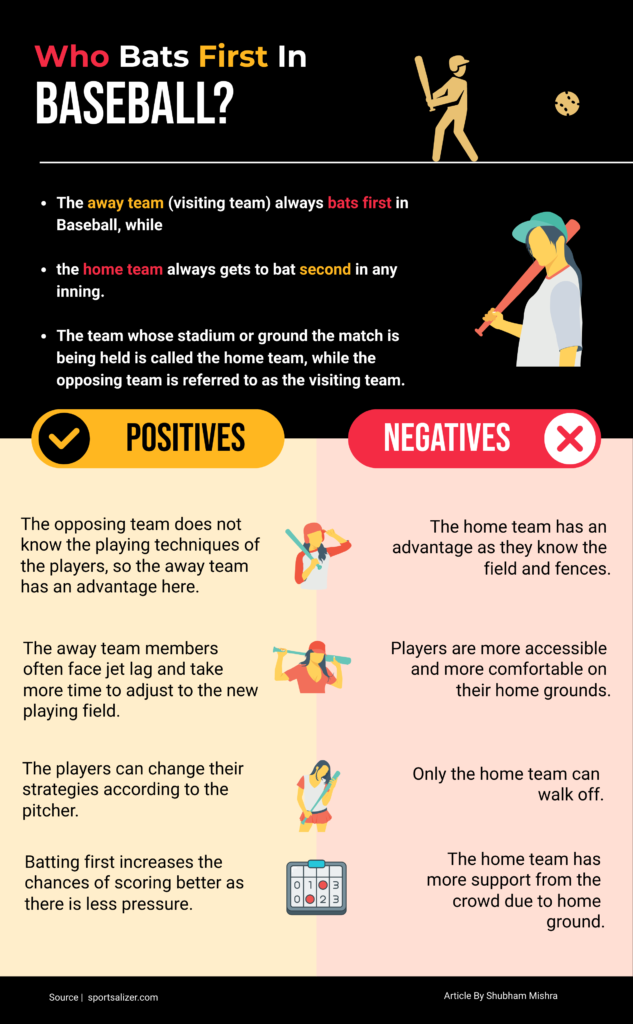Who Bats First In Baseball? Find Out Today!

A common question in the minds of every baseball enthusiast is, “who bats first in baseball”?
A baseball game is played between 2 teams of 9 players, each having 9 innings, in which each team alternates between batting and fielding in each inning.
Baseball has a simple rule, unlike most other games where a coin toss decides the team that gets to play first. Let’s look at how that works.
Contents
Who Bats First In Baseball?

The away team (visiting team) always bats first in Baseball, while the home team always gets to bat second in any inning. The team whose stadium or ground the match is being held is called the home team, while the opposing team is referred to as the visiting team.
When the game is held on neutral ground, one team is decided to become the team, and the other is the away team. Usually, a team with a higher rank is agreed to be the home team.
Sometimes, a coin is flipped, and the winner can choose whether their team will be the home team or the away team. Check out more about Baseball.
Batting Order
Their respective coaches/ team managers decide the batting order of each team. Unlike other games, where the teams choose which player goes next, in Baseball, the batting order is to be informed to the umpires and the opposing team.
The order should be followed during the entire course of the game unless a player is substituted due to injury.
The player who bats first in Baseball is known as the leadoff hitter.
Skills Required For A Leadoff Hitter
A team’s batting lineup acts as a very crucial fact in deciding the outcome of the game. The leadoff hitter being the first to bat sets up the game’s pace, which is essential in maintaining a good score overall. Hence a leadoff hitter should have these skills:
- Good Offense: The leadoff player should be able to sustain offense and defense in a short period.
- Agility: Agility means mental, physical, visual, and verbal coordination. For a leadoff hitter, agility is one of the essential skills required to get perfect hits.
- Focus: A leadoff hitter must be pretty focused on his game and not get distracted by external factors in the middle of the game.
- Speed: One of the essential skills required for a baseball player is speed. He must be fast to reach the bases quickly and get better scores.
- Patience: A leadoff hitter often has to make quick decisions during the game, so he should be able to make logical and correct decisions under pressure calmly and patiently.

Pros & Cons Of Batting First
| PROS | CONS |
|---|---|
| The opposing team does not know the playing techniques of the players, so the away team has an advantage here. | The home team has an advantage as they are aware of the field and fences. |
| The away team members often face jet lag and take more time to adjust to the new playing field. | Players are more accessible and more comfortable on their home grounds. |
| The players can change their strategies according to the pitcher. | Only the home team can walk off. |
| Batting first increases the chances of scoring better as there is less pressure. | The home team has more support from the crowd due to home ground. |
When Is A Player Out In Baseball
To have a basic understanding of the baseball game, one should be aware of when a player is declared out during the game. A player can be declared out in the following possible ways:
- Strikeout:- A strikeout occurs when a batter is called out for 3 strikes while batting. The strike zone is the area over the home plate from the center between a hitter’s shoulders and waist and a point just below the hitter’s knee. If the ball is thrown thrice in the strike zone, the hitter is declared out, no matter if he hits or misses the ball.
- Fly Out:- A catch-out in cricket is the fly-out in Baseball. When the hitter hits the ball, and the fielder catches it mid-air before it touches the ground, the hitter is declared out.
- Tag Out:- When a base runner is off base, and a fielder who has the ball touches the runner with the ball or their glove, the player is declared out. The fielder can also handle the base, and the runner running toward it is declared out.
Why Does the Home Team Bat Last?
In the early days, the home team consistently batted first. It was believed that the team that gets to bat first in Baseball has a less damaged ball which was considered an advantage for the team. The home team players have a “home-ground advantage.”
The home team players have an advantage over the visiting team players as they are more comfortable on their fields and are aware of the area and fences. Hence, a rule was made to keep the competition fair: the home team always bats last.
Does The Best Player Bat First & Worst Player Bat Last?
People often believe that the best player on the team should be the one who bats first in Baseball, but this is not true. The leadoff hitter should be a good base runner, and the second hitter should be a good bat handler.
Generally, the order is arranged so that the best all-around hitter should be in the third position. The ninth spot, or the last spot, is called the second leadoff spot, so a player having leadoff hitter qualities is assigned this position.
So the statement that the best player bats first in Baseball and the worst player bats last is entirely untrue.
FAQs
How does MLB decide which team bats first in Baseball?
The MLB does not decide who gets to bat first. There is a simple rule: the visiting team gets to bat in the top half, whereas the home team gets to bat in the bottom half of an inning.
What does it mean if you bat first?
The player who bats first is known as the leadoff hitter. He is responsible for starting the game and setting up the pace of the entire game. Speed is a significant factor required to have a good start for the game.
Where should the best player bat in the batting order?
Generally, the third position is assigned to the best all-around hitter. Usually, this spot is assigned to a batter with the best batting average and power.
Why only the Home Team can walk off?
A walk-off is when a team scores a winning run in the bottom of the ninth/ last inning. The Home Team plays last in every inning; only they have the chance to walk off, not the Away Team.










